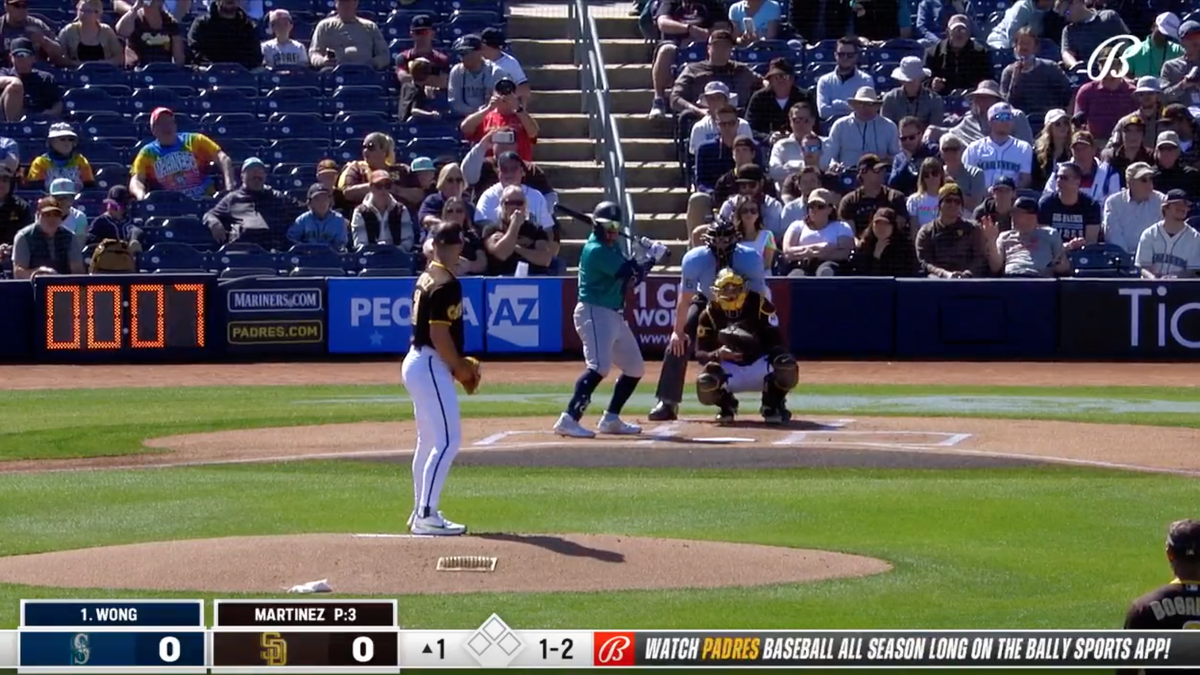Media is a powerful thing. No matter the event, most people discover and then follow the story through media coverage. When it comes to sports, no media is more powerful than television.
Yes, the world is changing and there are platforms now we could not even conceive of a decade ago. Digital outlets like Barstool and player-owned operations like Uninterrupted are as prominent as ever, but until those companies are paying the billions in broadcast rights fees that come from TV, most leagues and teams will turn to their television partners first when they are looking for input.
Downloads and impressions matter to some teams and leagues, but ratings still rule the day. TV still delivers the biggest audience, so its information is still the most valuable currency.
But maybe that currency has become too powerful.
This week, we saw baseball introduce a pitch clock and a batter’s clock during the first Spring Training games in Arizona. It isn’t just an experiment. These innovations are here to stay.
The rule changes register to me as an absolute zero. I don’t even like baseball. I am not watching no matter how much the game is sped up.
Plenty of my friends are baseball purists though and they absolutely hate this. They won’t shut up about it. To them, it isn’t just a bad idea. It is actually insulting. I don’t know if I believe them when they say they are going to stop watching because of it, but I do understand that timed anything is not a part of the sport they were sold on as kids.
I am considerably more invested in college football. You won’t hear me whining about conference re-alignment and bemoaning it as the beginning of the end of my favorite sport, but it isn’t lost on me that the only reason that USC vs Maryland is about to be a conference game is simply that FOX wants it to be.
There is no such thing as “enough” when it comes to any entertainer’s audience. Beyoncé is playing stadiums exclusively when her tour kicks off in July because why play in an arena that fits 15,000 when you can fill a stadium that holds 70,000? Baseball is thinking the same way. Why settle for an average audience of 2.11 million for nationally televised games when there are nearly 332 million people in America?
How do you add 330 million people to your audience? You ask TV executives what about your sport is a problem for them and you address those problems. Never mind how lifelong fans feel about a pitch clock, baseball is trying to find the lowest common denominator!
Don’t think I am railing against the passage of time here. I don’t do nostalgia for nostalgia’s sake. If at 41, I still like a show or album or movie that came out when I was 14, it is because the content is great, not because of what it reminds me of or how it makes me feel.
I simply want to acknowledge that plenty of leagues have given television tremendous power – maybe too much.
Let’s circle back to college football. The Pac-12, once one of the five best conferences in the sport, is about to be relegated to airing its biggest games in the middle of a ten-hour marathon of twenty-year-old episodes of Bones. Why? Because the appeal of USC outweighed the appeal of the other eleven teams. Now the Trojans, and their less significant little brother UCLA, get to justify road trips across three time zones in order to play all of their new rivals in the Big Ten.
My beloved SEC is no better. Sure, the states of Missouri, Oklahoma, and Texas connect to Arkansas, Kentucky, Louisiana and Tennessee respectively, but the connected footprint is just a bonus. The Tigers, Sooners, Longhorns and Aggies were added to the SEC because that is what the conference needed to do to make more money from CBS and ESPN.
NFL teams are playing on three days’ rest because TV executives saw an opportunity to juice ratings and revenue with games every Thursday. Upsets are virtually a thing of the past in the NBA Playoffs because there is more revenue to be made by selling commercial inventory for seven games in a first-round series than there was by selling it for five games. Shootouts are now a thing in the NHL because a tie tonight doesn’t make casual fans want to tune in tomorrow.
I want to be clear. I am not sure any of this is actually a bad thing. I’m simply pointing out that the reason any of these things are things at all is that they are better for the people in charge of the networks carrying the games, not because they make for better games.
Now, there have been a few innovations driven by television that have been undeniably good. Baseball fans would do well to acknowledge that basketball is much more enjoyable to watch thanks to the shot clock that eliminated the ability for a team to get up 10-8 and then just pass the ball from corner to corner to run out the clock. TV executives wanted more scoring, so the NHL shrank the size of the goalie’s pads and relaxed two-line pass rules. That made the game faster and more exciting.
Sports leagues generally owe a lot to television. But sometimes these leagues forget what TV owes to them. Playing by the rules of the entertainment industry has shifted the goal of the games. Sometimes the result is an innovative new approach that gives a tired sport a kick in the ass, but not always. Sometimes fans get pissed off and are forced to live with a product that is inferior to the one they truly love.

Demetri Ravanos is a columnist and features writer for Barrett Media. He is also the creator of The Sports Podcast Festival, and a previous host on the Chewing Clock and Media Noise podcasts. He occasionally fills in on stations across the Carolinas in addition to hosting Panthers and College Football podcasts. His radio resume includes stops at WAVH and WZEW in Mobile, AL, WBPT in Birmingham, AL and WBBB, WPTK and WDNC in Raleigh, NC.
You can find him on Twitter @DemetriRavanos or reach him by email at DemetriTheGreek@gmail.com.







